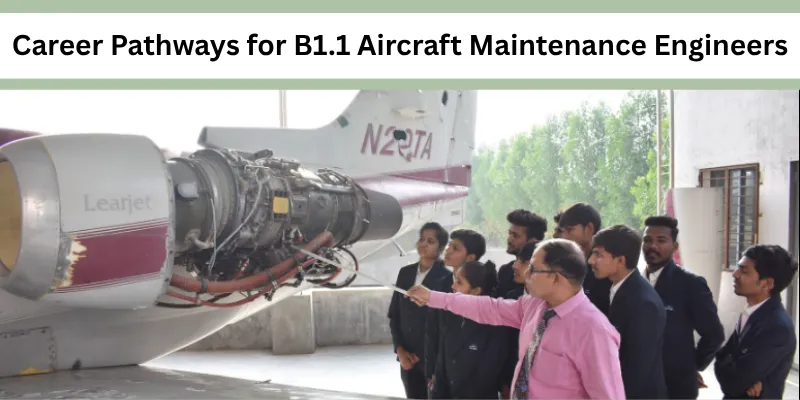

B1.1 Aircraft Maintenance Engineers ensures airplanes are safe and ready to fly, with a focus on engines and mechanical systems. Many think this job only leads to one path, but that’s not true.
This post explores real and surprising career options that go beyond the hangar and open new doors for your future.
Before exploring new careers, know what sets you apart as a B1.1 engineer. Your core skills go beyond aircraft—they’re valuable across many industries. Let’s break down your strengths.
B1.1 Engineers stay calm under pressure, solving problems fast without cutting corners. You think clearly in tough situations, like flight delays or engine issues. This skill makes you valuable not just in aviation, but in any job that demands smart, quick decisions.
In your work, precision is everything—there’s no room for “close enough.” You meet strict standards with consistency, showing you’re responsible, rule-focused, and deliver top-quality results. This rare discipline makes you stand out in both technical and leadership roles.
It’s easy to think of aircraft maintenance as a solo job, but it’s not. You talk with pilots, write clear reports, and hand over tasks to the next shift with no room for confusion. Your communication keeps things moving safely and smoothly.
Let’s explore exciting career paths that many engineers don’t think about, yet are well within reach.
Love helping others learn? You could become a technical trainer, teaching new engineers how to inspect and repair aircraft systems. Some go on to teach in aviation schools or create online courses.
You’ll still use your technical know-how, but now you’ll shape the future of aviation through education.
If you’re detail-oriented and value precision, quality, and safety, your roles may suit you. These focus less on fixing and more on ensuring all work meets strict safety standards, crucial for safe flights.
Ready to lead? These roles involve people, planning, and quick decisions. Fleet managers ensure timely service, while supervisors guide teams and fix issues fast, blending leadership with hands-on expertise.
The future of flight is here—drones, electric planes, and eVTOLs are taking off. As a B1.1 engineer, your aircraft knowledge fits perfectly in these fast-growing, tech-driven fields.
B1.1 Aircraft Maintenance Engineers are in demand worldwide. From high-tech hangars in Germany to contracts in the Middle East, global work means new opportunities and better pay. Here’s how to get there.
Working with Foreign Airlines or MROs
International airlines and MROs seek skilled engineers with hands-on experience. If you know large jets, safety, and inspections, your skills open global doors.
Why it’s exciting:
Contract-Based Travel Assignments (Well-Paid + High-Adrenaline)
Not ready to move abroad for good? Try contract jobs—short-term, high-paying roles in global airports or remote sites where fast fixes matter.
Certifications That Open Global Doors (EASA, CASA, DGCA, FAA Crossover Tips)
To work abroad, you’ll often need more than just skills—you’ll need the right certifications.
If you already hold one license, many authorities offer cross-certification options. That means you may not have to start from scratch!
Let’s break down three smart ways to shape your future starting today.
Why Your Logbook is Also Your Portfolio
Think your logbook is just paperwork? Think again. Every entry is proof of your hands-on experience—your real value.
LinkedIn for Engineers: What You Should Be Posting
LinkedIn isn’t just for office jobs. It’s your digital business card—and a place to show you're more than just a license number.
Post ideas:
Keep it professional, friendly, and real. You don’t need fancy words—just show your passion and skill.
Networking with Purpose: Online and In the Hangar
Networking isn’t just for suits and ties. It’s about talking to people who can help you grow—and who you can help, too.
Online:
On the job:
Small conversations can lead to big opportunities.
Let’s look at some exciting new directions where your experience can take off, without even touching a plane.
Engineering Roles in Rail, Renewable Energy, or Robotics
Your skills go beyond aircraft. Rail, renewable energy, and robotics all need experts in systems, safety, and precision. From wind turbines to factory robots, your experience fits right in.
Tech Writing, Compliance Consulting, or Inspections in Other Industries
Not everyone stays hands-on. Many B1.1 engineers shift to technical writing, explaining systems clearly. Others move into compliance roles, guiding industries on safety rules. Inspection jobs in manufacturing, shipping, or healthcare also need your skills in checking and documenting systems, giving you a strong edge.
Startups & Innovation Labs That Value Aviation Precision
Startups value people who can build, fix, and stay calm under pressure, just like you in the hangar. That’s why tech, transport, and clean energy companies often seek aviation pros. Innovation labs also need fast, precise problem-solvers to test and improve drones, robots, and electric vehicles. Your skills are in demand.
Your skills can take you far, on or off the runway. Don’t just follow the usual path. Think about what truly excites you, whether it’s teaching, tech, or travel.
The aviation world trained you well, but your future is wide open. So, take a moment and ask yourself: What’s your next move?